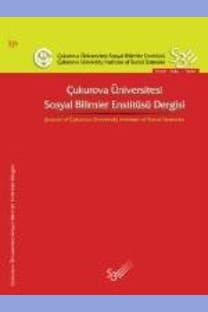AN ANALYSIS OF TURKISH ACCOUNTING REGULATION’S CONFORMITY WITH THE DISCLOSURE PROVISIONS OF THE EU DIRECTIVE
xx
AN ANALYSIS OF TURKISH ACCOUNTING REGULATION’S CONFORMITY WITH THE DISCLOSURE PROVISIONS OF THE EU DIRECTIVE
Disclosure requirements, conformity, EU Directive Turkish regulation,
___
- Adams, C. A. and McMillan, K. M. (1997), Internationalising Financial Reporting in a Newly Emerging Market Economy: The Polish Example, Advances in International Accounting, Vol. 10: 134-169.
- Adhikari, A. and Tondkar, R. H. (1992), Environmental Factors Influencing Accounting Disclosure Requirements of Global Stock Exchange, Journal of International Management and Accounting, Vol. 4, No. 2: 75-105.
- Akdogan, N. (1991), Dorduncu Yonergenin Ongordugu Bilanco Tablosu ve Ulkemizdeki Uygulamalarla Karsilastirilmasi, (Balance Sheet Format of the Fourth Directive and Comparison of it with the Format Used in Turkey), Türkiye XII Muhasebe Egitimi Sempozyumunda Sunulan Bildiri (Paper Presented in Accounting Education Symposium No.XII), Girne, Kibris.
- Alexander, D. and Archer, S. (1992), The European Accounting Guide, Academic Press, London.
- Boross, A. H. Clarkson, A. H. and Fraser, M. (1995), Pressure and Conflicts in Moving Towards Harmonisation of Accounting Practice: The Hungarian Experience, The European Accounting Review, Vol. 4, No. 4: 713-737.
- Choi, F. D. S. and Mueller, G. G. (1992), International Accounting (2nd Ed.), Prentice-Hall inc., New Jersey, USA.
- Çürük, T. (2000), An Analysis of Factors Influencing Accounting Disclosure in
- Turkey, İstanbul Menkul Kıymetler Borsası, İstanbul.
- Gray, S. J. (1984), International Accounting Standards: Some Observations on Developments in Private and Public Regulation, in Gaffikin, M. J. R. (Ed.), Contemporary Accounting Thought, Prentice-Hall, Sydney.
- Hopwood, A. G. (1994), Some Reflections on the Harmonisation of Accounting within the EU, The European Accounting Review, Vol. 3, No. 2: 241-253.
- Illes, P. W., Clarkson, A. H. and Fraser, M. (1996), Change and Choice in Hungarian Accounting Practice, The European Accounting Review, Vol. 5, No. 3: 523- 545.
- Yalkin, Y. K. (2000) On the Road of European Union, Expected Accounting Harmonisation Problems in Turkey and Recommended Solutions (Avrupa Birliği Yolundaki Türkiye’de Beklenen Muhasebe Harmonisasyon Sorunları ve Çözüm Önerileri) Muhasebe Bilim Dünyası Dergisi, Vol. 2,No. 1: 1-18
- Lukas, W. (1992), Austria, in Alexander, D. and Archer, S. (Eds.), The European Accounting Guide, Academic Press, London: 703-731.
- Mugan, C. S. (1995), Accounting in Turkey, European Accounting Review, Vol. 4, No. 2: 351-371.
- Nasi, S. (1992), Finland, In Alexander, D. and Archer, S. (Eds.), The European Accounting Guide, Academic Press, London: 733-765.
- Niehus, R. (1972), Harmonized Economic Community Accounting - A German View of the Draft Directive for Uniform Accounting Rules, The International Journal of Accounting Education and Research, Vol. 7, No. 2, Spring: 91- 125.
- Nobes, C. (1983), The Evolution of the Harmonizing Provisions of the 1980 and 1981 Companies Acts, Accounting and Business Research, Vol. 13, No. 53, Winter: 43-53.
- Nobes, C. (1991), The Baring Securities Guide to International Financial Reporting, Blackwell, UK.
- Nobes, C. and Parker, R. (1995), Comparative International Accounting (4th Ed.), Prentice Hall, UK.
- Roberts, C. B., Salter, S. B. and Kantor, J. (1996), The IASC Comparability Project and Current Financial Reporting Reality: An Empirical Study of Reporting in Europe, British Accounting Review, No. 28: 1-22.
- Siegel, S. (1956), Non-parametric Statistics for the Behavioural Sciences, McGraw Hill, NY.
- Tay, S. W. (1989), Corporate Financial Reporting Regulatory Systems and Comparability, Ph.D. Thesis, University of Exeter, UK.
- Whinney, M. and Ernst, E. (1978), The Fourth Directive: Its Effect on the Annual Accounts of Companies in the UK and Ireland, Kluwer Publishing, London.
- ISSN: 1304-8880
- Yayın Aralığı: 2
- Başlangıç: 2013
- Yayıncı: Çukurova Üniversitesi Sosyal Bilimler Enstitüsü Dergisi
E-DEVLET UYGULAMALARINDA BİLGİ VE PAYLAŞIM GÜVENLİĞİ
Öğr. Gör. Akın EFENDİOĞLU, Öğr. Gör. Emre SEZGİN
MERSİN MÜZESİ’NDE BULUNAN MEGARA KASELERİ
Yard.doç.dr.hatice Yılmazer ÇORBACI
Abdulla Qodiriy'nin Tarihsel Romanları
Degres D’implantation Du Neologisme Dans Le Vocabulaire Turc
Yrd.doç.dr. Aşkın Çokövün TURUNÇ
Yrd. Doç. Dr. Pınar Süral ÖZER, Tayfun TOPALOĞLU
Finansal Gelişme Ve Ekonomik Büyüme Arasındaki ilişkinin Araştırılması
Dr. Serkan Yılmaz KANDIR, Arş. Gör. Ömer İSKENDEROĞLU, Prof Dr. Yıldırım B. ÖNAL
THE ACCESS TYPE OF UNIVERSAL GRAMMAR IN CHILD SECOND LANGUAGE ACQUISITION
